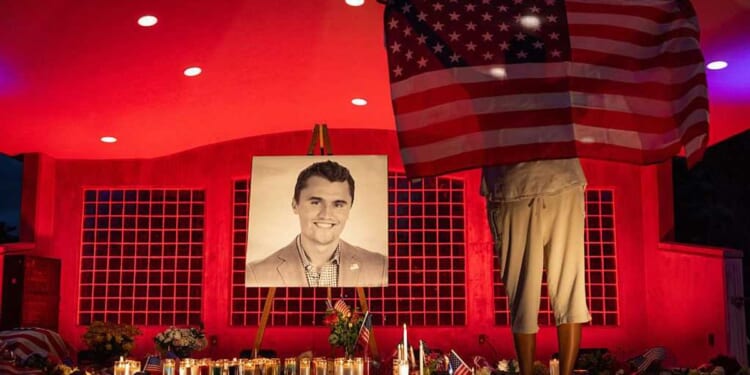Why is human life valuable?
Alex O’Connor, an online atheist whose popularity has skyrocketed in recent years, recently said this: “I call myself an ethical emotivist, by which I mean that I think ethical statements — statements like ‘Murder is wrong’, ‘Charity is good’, or ‘You shouldn’t steal’ — are expressions of emotional attitudes, and nothing more. They are not objective truth-claims.”
What Christianity provides, and atheism lacks, is an objective standard that can be universally held up to defend human life.
O’Connor, by all accounts, is an upstanding member of society. Not only does he not kill or steal, but he has become famous for treating his debate opponents with respect, especially in comparison to famous atheist polemicists like Christopher Hitchens. He should be applauded for that.
But in his morally relativistic view, human life is only as valuable as his emotions, or anyone else’s emotions, permit.
Tyler Robinson, the alleged assassin of Charlie Kirk, had a very different set of emotions from Alex O’Connor. Whatever respect O’Connor subjectively chooses to show for human beings, Robinson allegedly chose the opposite. Robinson allegedly believed — subjectively — that the value of human life ended where his political resentments began.
If you’re Alex O’Connor, what would you say to a political assassin? How would you convince him that he’s wrong to devalue human life?
Objectively, you couldn’t. Because O’Connor doesn’t think the statement “human life has value” is objectively true, but rather a matter of personal tastes. Even if he personally finds Robinson’s alleged views and actions repugnant, he couldn’t point to any objective standard to justify that.
The trouble with atheism isn’t that atheists personally live immoral lives. Everyone has met atheists who are good spouses, good parents, and good citizens. The problem is that atheism can’t provide an objective defense to the proposition that all human life should be valued by everybody all the time.
According to atheist Richard Dawkins, “We are survival machines — robot vehicles blindly programmed to preserve the selfish molecules known as genes.”
People discard machines routinely without any thought at all — laptops, phones, iPads, cars, and many other things. Drive down to the local junkyard and look at the decaying and forgotten corpses of old Toyota Camrys. No one mourns them, no one gave them a funeral, no one had moral qualms about throwing them away.
If Dawkins’ description of human beings as “survival machines” and “robot vehicles blindly programmed” is accurate, then why would human beings be any different from those Toyota Camrys?
Atheism has no answer to that question — but Christianity does.
RELATED: Why atheism can’t explain the one thing that matters

In his landmark work “Theology of the Body,” Pope John Paul II said this:
Man, whom God created male and female, bears the divine image imprinted on his body “from the beginning.”
This is a restatement of Genesis 1:26, which is the foundation of Christian anthropology. In this verse, God declares: “Let us make man in our image, after our likeness.” Man has objective dignity because man bears the divine image.
Romans 5:8 goes on to say: “But God shows his love for us in that while we were yet sinners Christ died for us.” This shows that even serious moral failings do not eliminate the objective dignity of a human being.
“Dignitas Infinita,” a Vatican document released in 2024 and approved by Pope Francis, further states that “every human person possesses an infinite dignity, inalienably grounded in his or her very being, which prevails in and beyond every circumstance, state, or situation the person may ever encounter.”
If Christianity is true, then God is the author of truth itself. And if God is the author of truth itself, and he has assigned infinite dignity to all human beings, then that dignity is a universal truth not dependent on the emotions or whims of any person.
Of course, this does not guarantee that Christians will live by that. Many so-called Christians have warped ideas of what their faith demands. Some use it as a cloak for their political ideology. Vance Boelter, who allegedly murdered former Minnesota Speaker Melissa Hortman and her husband, seemingly had no respect for human life.
But what Christianity provides, and atheism lacks, is an objective standard that can be universally held up to defend human life against anyone who threatens it. It provides an objective way to say “Tyler Robinson is wrong,” instead of “I personally don’t like what Tyler Robinson [allegedly] did.”
This matters deeply at the societal level, and the data bears it out.
According to Pew Research, in 1972, 90% of U.S. adults identified as Christians, while 5% identified as religiously unaffiliated. By 2022, the percentage of Christians had shrunk to 63% while the religiously unaffiliated percentage had risen to 29%. This is mirrored in other Western countries, often even more precipitously: 90% of Canadians in 1971 identified as Christian, according to census data, with only 4% identifying as non-religious. By 2021, the Christian percentage was just 52% and the non-religious percentage had risen to 34%.
Of course, “religiously unaffiliated” or “non-religious” are nebulous terms that might not refer to atheism in the strictest sense, but at best, they refer to a vague and subjective worldview that, like atheism, allows for someone to assign his own subjective morality, or lack thereof.
The effects of this shift can be seen with the explosion of abortions in the U.S. that coincided with the acceleration of secularism in the 1970s and 1980s. According to the Guttmacher Institute, abortions skyrocketed from 744,000 in 1973, the year Roe v. Wade was handed down, to a peak of 1.6 million in 1990, and to this day they remain well above the 1973 levels, though they have mercifully declined in recent years.
Euthanasia has gained immense popularity in the secular age as well. A horrifying report in the Atlantic — hardly a conservative publication — described how Canadians of all walks of life are requesting doctors to kill them in order to end some form of physical or emotional suffering they are experiencing.
In fact, under Canada’s euthanasia law, mental illness alone will be sufficient for eligibility by 2027 to terminate one’s own life with the help of doctors.
Mass shootings have dramatically increased as secularism has spread. While humans have been killing each other since the fall of man, such killing has usually had a clear motive of some kind: defeating another nation in battle or seeking some form of regime change.
Mass shootings, however, represent a nihilistic form of violence apparently driven by narcissism that has no clear precedent in human history. According to the Violence Project, there were only five mass shootings between 1965 and 1969, but that number rose to 33 between 2015 and 2019 — a shocking increase of over 600%.
Nearly everyone condemns mass shootings, though unfortunately, the same cannot be said about abortion or euthanasia.
But in an atheistic paradigm, can that condemnation be based on anything other than personal emotions, as O’Connor admits his opposition to murder is based on?
RELATED: How the godless elite let the truth slip about atheism

As people increasingly treat the value of human life as subjective, consistent with O’Connor’s “emotivist” view, it seems that more and more people are willing to subjectively insert exceptions into their worldview — situations where life can, in fact, be discarded like an old Toyota Camry.
Does this prove Christianity? Not by itself. Just because something would be helpful if it were true doesn’t mean it’s true.
But at the very least, it should make people open to hearing the arguments for Christianity. It should make people want it to be true, and it should move them to investigate the evidence for why it might be. Many people dislike religion and plug their ears when the topic comes up. But the alternative is too dark to just casually accept without any consideration.
Why is human life valuable? In today’s chaotic age, a subjective answer to that question is simply not enough.
















